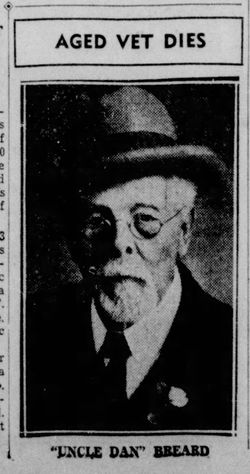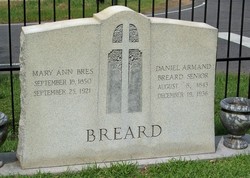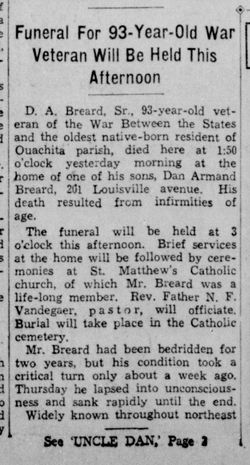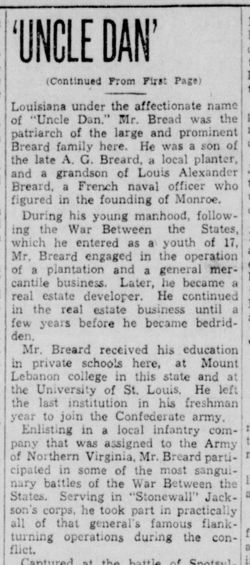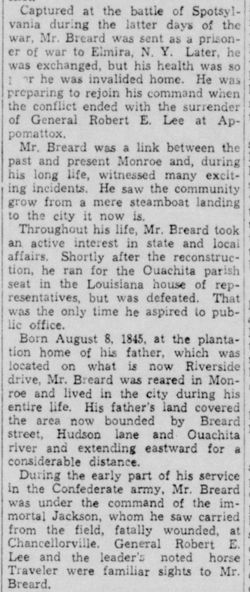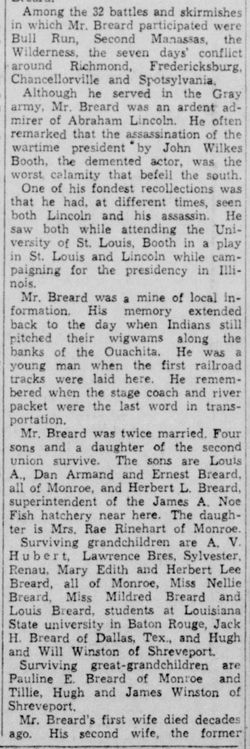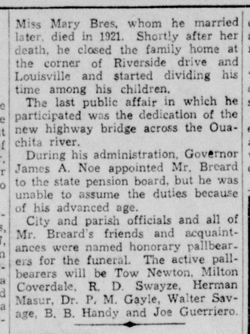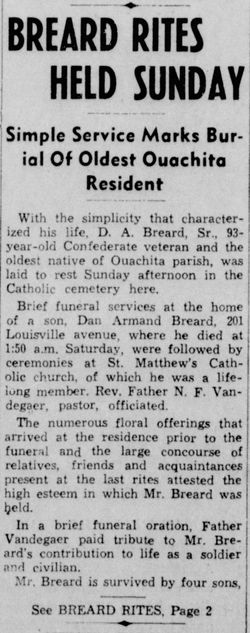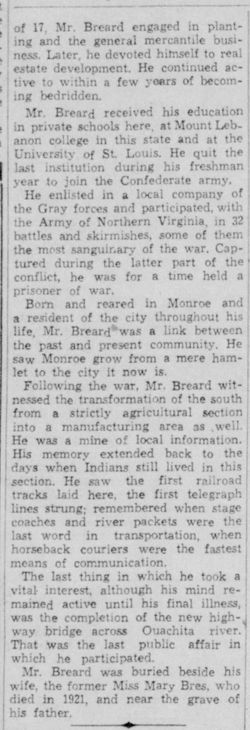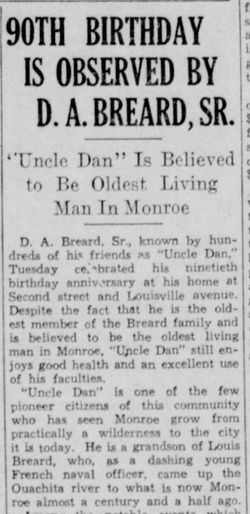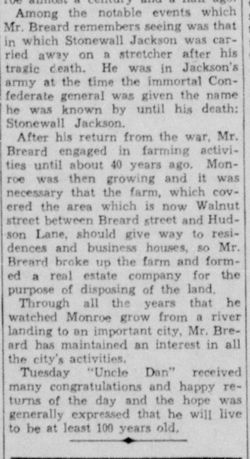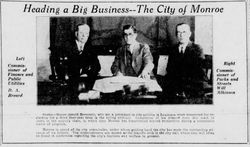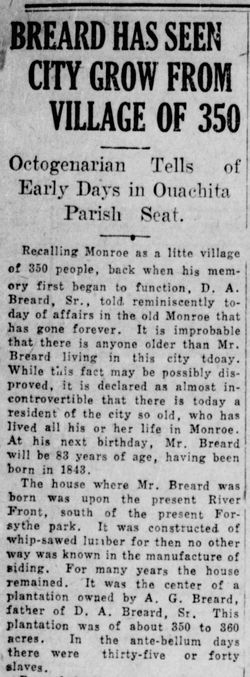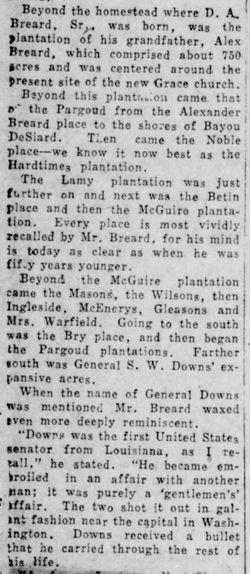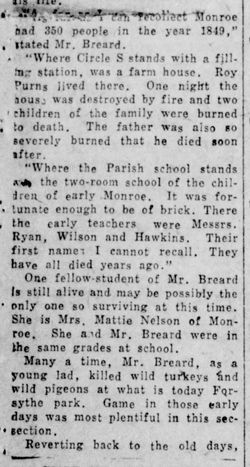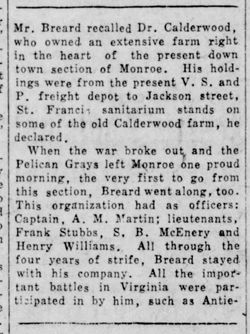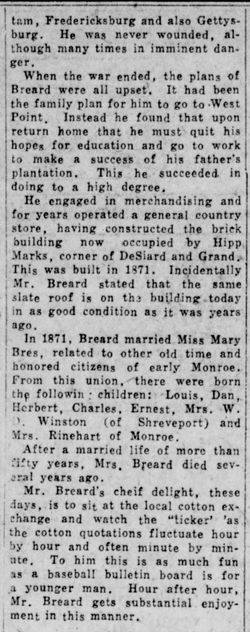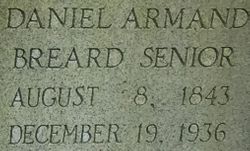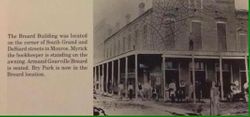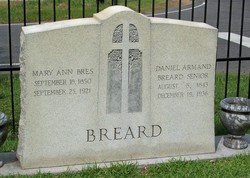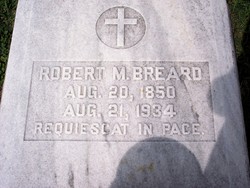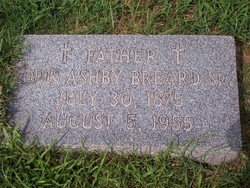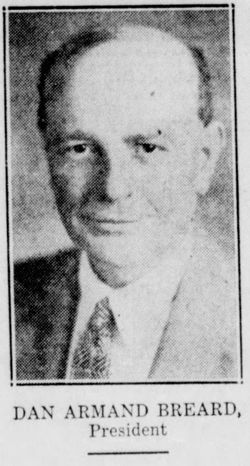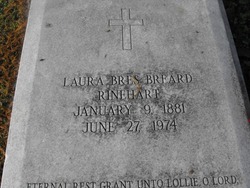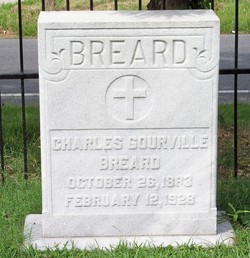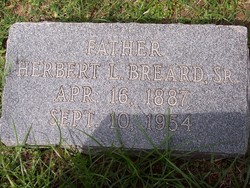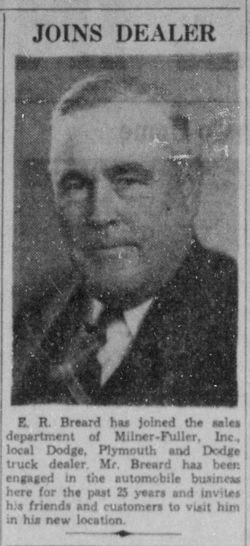| Description |
: |
Monroe Morning World (Monroe, Louisiana) Sunday - 20 Dec 1936 pg1 & 2'
'UNCLE DAN' BREARD, PARISH'S OLDEST NATIVE CITIZEN, DIES
Funeral For 93-Year-Old War Veteran Will Be Held This Afternoon
D. A. Breard, Sr., 93 year old veteran of the War Between the States and the oldest native-born resident of Ouachita Parish, died here at 1:50 o'clock yesterday morning at the home of his son, Dan Armand Breard, Jr., 201 Louisville avenue. His death resulted from infirmities of age.
The funeral will be held at 3 o'clock this afternoon. Brief services at the...
Read More
|
Monroe Morning World (Monroe, Louisiana) Sunday - 20 Dec 1936 pg1 & 2'
'UNCLE DAN' BREARD, PARISH'S OLDEST NATIVE CITIZEN, DIES
Funeral For 93-Year-Old War Veteran Will Be Held This Afternoon
D. A. Breard, Sr., 93 year old veteran of the War Between the States and the oldest native-born resident of Ouachita Parish, died here at 1:50 o'clock yesterday morning at the home of his son, Dan Armand Breard, Jr., 201 Louisville avenue. His death resulted from infirmities of age.
The funeral will be held at 3 o'clock this afternoon. Brief services at the home will be followed by ceremonies at St. Matthew's Catholic church, of which Mr. Breard was a life-long member. Rev. Father N. F. Vandegaer, pastor, will officiate. Burial will be in the Catholic cemetery.
Mr. Breard had been bed-ridden for two years, but his condition took a critical turn only about a week ago. Thursday he lapsed into unconsciousness and sank rapidly until the end.
Widely known throughout northeast Louisiana under the affectionate name of "Uncle Dan." Mr. Breard was the patriarch of the large and prominent Breard family here. He was a son of the late A. G. Breard, a local planter, and a grandson of Louis Alexander Breard, a French naval officer who figured in the founding of Monroe.
During his young manhood, following the War Between the States, which he entered as a youth of 17, Mr. Breard engaged in the operation of a plantation and a general mercantile business. Later, he became a real estate developer. He continued in the real estate business until a few years ago before he became bed-ridden.
Mr. Breard received his education in private schools here, at Mount Lebanon college in this state and at the University of St. Louis. He left the last institution in his freshman year to join the Confederate army.
Enlisting in a local infantry company that was assigned to the Army of Nothern Virginia, Mr. Breard participated in some of the most sanguinary battles of the War Between the States. Serving in "Stonewall" Jackson's corps, he took part in practically all of that general's famous flank-turning operations during the conflict.
Captured at the battle of Spotsylvania during the latter days of the war, Mr. Breard was sent as a prisoner of war to Elmira, New York. Later, he exchanged, but his health was so poor he was invalided home. He was preparing to rejoin his command when the conflict ended with the surrender of General Robert E. Lee at Appomattox.
Mr. Breard was a link between the past and present Monroe and, during his long life, witnessed many exciting incidents. He saw the community grow from a mere steamboat landing to the city it now is.
Throughout his life, Mr. Breard took an active interest in state and local affairs. Shortly after the reconstruction, he ran for Ouachita parish seat in the Louisiana house of representative, but was defeated. That was the only time he aspired to public office.
Born August 8, 1845, at the plantation home of his father, which was located on what is now Riverside drive, Mr. Breard was reared in Monroe and lived in the city during his entire life. His father's land covered the area now bounded by Breard Street, Hudson Lane and the Ouachita River and extending eastward for a considerable distance.
During the early part of his service in the Confederate army, Mr. Breard was under the command of the immortal Jackson, whom he saw carried from the field, fatally wounded at Chancellorville. General Robert E Lee and the leader's noted horse Traveler were familiar sights to Mr. Breard.
Among 32 battles and skirmishes in which Mr. Breard participated were Bull Run, Second Manassas, the Wilderness, the seven days' conflict around Richmond, Fredericksburg, Chancellorville and Spotsylvania.
Although he served in the Gray army, Mr. Breard was an ardent admirer of Abraham Lincoln. He often remarked that the assassination of the wartime president by John Wilkes Booth, the demented actor, was the worst calamity that befell the South.
One of his fondest recollections was that he had, at different times, seen both Lincoln and his assassin. He saw both while attending the University of St. Louis and Lincoln while campaigning for the presidency in Illinois.
Mr. Breard was a mine of local information. His memory extended back to the day when Indians still pitched their wigwams along the banks of the Ouachita. He was a young man when the first railroad tracks were laid here. He remembered when the stage coach and river packet were the last word in transportation.
Mr. Breard was twice married. Four sons and a daughter of the second union survive. The sons are:
Louis A Breard of Monroe, La
Daniel Armond Breard of Monroe, La
Ernest R Breard of Monroe, La
Herbert L. Breard, superintendent of the James A. Noe fish hatchery near here.
Two daughters
Mrs. Rae Rinehart of Monroe, La.
Mathilde Breard Winston of Shreveport
Surviving grandchildren are: A. B. Herbert, Lawrence Bres, Sylvester Reneau all of Monroe.
Miss Nellie Breard, Miss Mildred Breard and Louis Breard, students at Louisiana State university in Baton Rouge. Jack H. Breard of Dallas, Texas and Hugh and Will Winston of Shreveport.
Surviving great-grandchildren are Pauline E. Breard of Monroe and Tillie,
Hugh of James Winston of Shreveport
Mr. Breard's first wife died decades ago. His second wife, the former Miss Mary Bres, whom he married later, died in 1921. Shortley after her death, he closed the family home at the corner of Riverside drive and Louisville and started dividing he time among his children.
The last public affair in which he participated was the dedication of the new highway bridge across the Ouachita River.
During his administration, Governor James A. Noe appointed Mr. Breard to the state pension board, but he was unable to assume the duties because of his advanced age.
City and parish officials and all of Mr. Breard's friends and acquaintances were named honorary pallbearers for the funeral. The active pallbearers will be Tow Newton, Milton Coverdale, R D Swayze, Herman Masur, Dr. P M Gayle, Walter Savage, B B Handy and Joe Guerriero.
The Monroe News-Star (Monroe, Louisiana) Fri - 4 Dec 1925 pg5
BREARD HAS SEEN CITY CROW FROM VILLAGE OF 350
Octogenarian Tells of Early Days in Ouachita Parish Seat
Recalling Monroe as a little village of 350 people, back when his memory first began to function, D. A. Breard, Sr., told reminiscently today of affairs of the old Monroe that has gone forever. At his next birthday, Mr. Breard will be 83 years of age, having been born in 1843,
The house where Mr. Breard was born was upon the present River Front, south of the present Forsythe park. It was constructed of whip-sawed lumber for then on other was was known in the manufacture of siding. For many years the house remained. It was a center of a plantation owned by A. G. Breard, father of D. A. Breard, Sr. This plantation was of about 350 to 360 acres. In the ante-bellum days there were thirty-five or forty slaves.
Beyond the homstead where D. A. Breard, Sr., was born, was the plantation of his grandfather, Alex Breard, which comprised about 750 acres and was centered around the present site of the New Grace church.
Beyond this plantation came that of the Pargoud from the Alexander Breard place to the shores of Bauou DeSiard. Then came the Noble place - we know it now best as the Hardtimes plantation.
The Lamy plantation was just further on and next was the Betin place and then the McGuire plantation. Every place is most vividly recalled by Mr. Breard, for his mind is today as clear as when he was fifty years younger.
Beyond the McGuire plantation came the Masons, the Wilsons, then Ingleside, McEnerys, Gleasons and Mrs. Warfield. Going to the south was the Bry place, and then began the Pargoud plantation. Further south was General S. W. Down's expansive acres.
When the name of Generals Downs was mentioned, Mr. Breard waxed even more deeply reminiscent.
"Downs was the first United States senator from Louisiana, as I recall," he states. "He became embroiled in an affair with another man; it was purely a 'gentlemen's' affair. The two shot it out in gallant fashion near the capital in Washington. Downs received a bullet that he carried through the rest of his life.
"As far as I can recollect, Monroe had 350 people in the year 1849," stated Mr. Breard.
"Where Circle S stands with a filling station, was a farm house. Roy Burns lived there. One night the house was destroyed by fire and two children of the family were burned to death. The father was also so severely burned that he died soon after."
"Where the Parish school stands was the two-room school of the children of early Monroe. It was fortunate enough to be of brick. There the early teachers where Messrs. Ryan, Wilson and Hawkins. Their first names I can not recall. They have all died years ago."
One fellow student of Mr. Breard is still alive and may be possibly the only one so surviving at this time. She is Mattie Nelson of Monroe. She and Mr. Breard were in the same grades at school.
Many a time, Mr. Breard, as a young lad, killed wild turkeys and wild pigeons at what today is Forsythe Park. Game in those early days was most plentiful in this section.
Revertin back to the old days, Mr. Breard recalled Dr. Calderwood, who owned an extensive farm right in the heart of the present downtown section of Monroe. His holdings were from the present Vicksburg, Shreveport & Pacific (now Illinois Central Railroad) freight depot to Jackson street, St. Francis sanitarium stand on some of the old Calderwood farm, he declared.
When the the war broke out and the Pelican Grays left Monroe one proud morning, the very first to go from this section, Breard went along, too. This organization had as officers: Captain A M Martin; lieutenants, Frank Stubbs, S. B. McEnery and Henry Williams. All through the four years of strife, Breard stayed with his company. All the important battles in Virginia were participated in him, such as Antietam, Frederickburg and also Gettysburg. He was never wounded, although many times in imminent danger.
When the war ended, the plans of Breard were all upset. It had been the family plan for him to go to West Point. Instead he found that upon return home that he must quit his hopes for education and go to work to make a success of his father's plantation. This he succeeded in doing to a high degree.
He engaged in merchandising and for years operated a general country store, having constructed the brick building now occupied by Hipp Marks, corner of DeSiard and Grand. This was built in 1871. Incidentally Mr. Breard stated that the same slate roof is on the building today in as good condition as it was years ago.
In 1871, Mr. Breard married Miss Mary Bres, related to other old time and honored citizens of early Monroe. From this union, there were born the following children: Louis, Dan, Herbert, Charles, Ernest, Mrs. W. O Winston (of Shreveport) and Mrs. Rinehart of Monroe. After a married life of more than fifty years, Mrs. Breard died several years ago.
Mr. Breard's chief delight, these days, is to sit at the local cotton exchange and watch the "ticker" as the cotton quotations fluctuate hour by hour and often minute by minute. To him this is as much fun as a baseball bulletin board is for a younger man. Hour after hour, Mr. Breard gets substantial enjoyment in this manner. |

